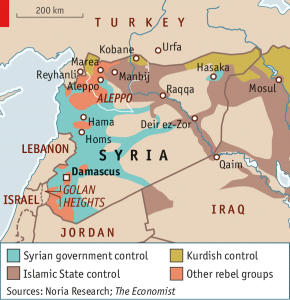This week, my two Diigo posts were about the relationship between the PKK and the Turkish government and how that relationship affected Turkey’s response to the ISIS conflict. Turkey and the PKK have a decades long history of conflict that has continued to this day: recently, the PKK torched Turkish schools because the Turkish government failed to provide Kurdish-language classes in Kurdish schools and forcibly shut down any private Kurdish language lessons even after an agreed upon treaty that would allow them. While this conflict has lead to plenty of problems on its own, it has greatly complicated Turkey’s response to ISIS.
My first Diigo post is an opinion piece written by Cegniz Aktar, Senior Scholar at the Istanbul Policy Center, a director at the UN, and one of the leading advocates of Turkey’s integration into the EU. In this piece, Aktar argues that Turkish politician “fearing the birth of a Kurdish nation-state more than anything but eager on the other hand to assert their regional supremacy, are ending up by alienating all three Kurdish communities” in Iraq, Syria, and Turkey. He is referring specifically to President Ankara making a speech comparing the PKK to ISIL, a few days after stating that the PKK should be fighting ISIL rather than Turkey. Even though the Turkish government has been an economic partner of the Iraqi Kurds, they have offered them no military support, and have also preventing Turkish Kurds from joining the fight against ISIL. The Turkish government’s fear of a sovereign Kurdish state is leading to extremely poor diplomatic outcomes, and making it much easier for ISIS to take military action. The map above depicts the regions in which various groups have control, as of October 4, 2014.
My other post is This is a news report by The Economist about the Turkish government’s reaction to ISIL’s assault on Kobane, a Kurdish town in Syria on the border of Turkey. This town is one of three enclaves that are governed by the Kurds. Turkey ceded the area to PKK control, but PKK leaders claim that by not assisting in the fight, the Turkish government is indirectly supporting ISIS. Even though Turkey is a member of the coalition to fight ISIS, its unwillingness to treat the PKK as a legitmate governing body or offer them any assistance is allowing ISIS to gain ground.
